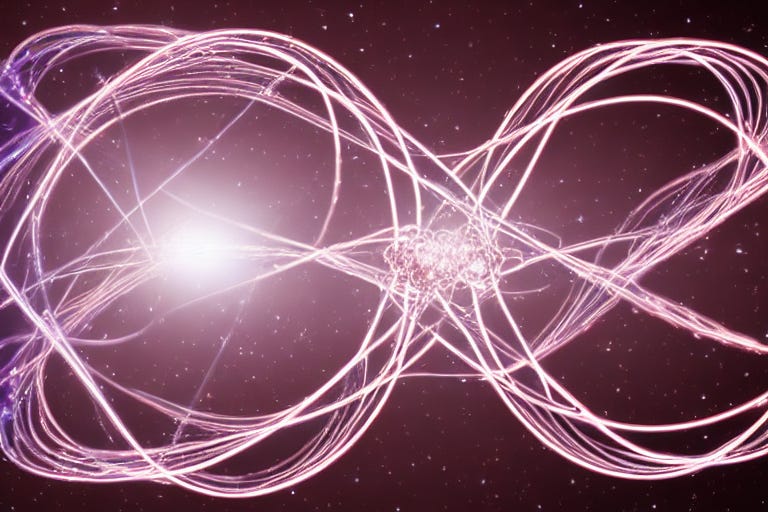Beyond Bits and Bytes: The Quantum Revolution happens now
Understanding the Principles of Quantum Mechanics
I recently summarized what key companies such as Gartner predict for 2025. Quite understandably, there was a lot of ‘next level GenAI’ part of it - things like Agentic AI for example. But also Polyfunctional Robotics or Spatial Computing was part of the trend mix for 2025. But something that really completely blows my mind, and at the same time has made significant progress lately, is Quantum Computing. I think it’s time to take a deeper look at quantum computing and to finally prepare for it.

The world of computers is on the cusp of a mind-blowing transformation. We're not just talking faster processors or sleeker designs – we're entering the era of quantum computing. This revolutionary technology utilizes the strange and wonderful laws of quantum mechanics to unlock computing power beyond our wildest dreams.
From classical to quantum computing
But before we delve into the fantastical, let's revisit the familiar. Our trusty computers rely on bits, tiny switches that can be either on (1) or off (0). This binary system forms the foundation of all our digital information. Quantum computing, however, throws a wrench into the works by introducing qubits. These are like superpowered bits – they can be 0, 1, or both at the same time (thanks to a mind-bending concept called superposition). Imagine a coin spinning in the air, representing both heads and tails simultaneously. That's the power of superposition!
Here's a deeper look into some fundamental concepts of quantum computing:
Quantum Mechanics: This branch of physics governs the behavior of the ultra-small, where particles defy our everyday understanding. It's the playground where qubits exist and exhibit their mind-blowing properties. Like… superposition and entanglement!
Superposition: This is a fundamental principle in quantum mechanics that allows a quantum system (like a qubit) to exist in multiple states simultaneously. Unlike a classical bit that is either 0 or 1, a qubit in superposition is in a combination of both states until it is measured (then it becomes 0 or 1 again). Think of it like a dimmer switch that can be set to any value between off and on, rather than just being fully on or fully off like a regular light switch. This ability to be in multiple states at once gives quantum computers a massive advantage in exploring many possibilities simultaneously.
Entanglement: Imagine two coins linked in a way that flipping one instantly flips the other, no matter the distance. That's the spooky phenomenon of entanglement, where two qubits become eerily connected and share the same fate. Albert Einstein coined it “Spooky Action at a distance” - “Spukhafte Fernwirkung” in German and it’s really quite hard to grasp and kind of spooky I must say.
Quantum Decoherence: This is the bane of quantum computing. Qubits are incredibly fragile and easily disturbed by interactions with their environment (heat, electromagnetic fields, etc.). When this happens, they lose their superposition and entanglement, essentially reverting to classical bits. This loss of quantum properties is called decoherence. It's like the spinning coin suddenly landing on either heads or tails. Maintaining coherence for as long as possible is one of the biggest challenges in building practical quantum computers.
Quantum Gates: Think of these as the control panels for qubits. They manipulate the state of qubits to perform calculations, much like the logic gates in classical computers.
Here’s also a video that explains core concepts like Quantum Mechanics or Entanglement in a fun video:
While research is actively developing and improving qubit technology, there are challenges to overcome. Maintaining the fragile state of qubits (avoiding so-called decoherence) and correcting errors are crucial hurdles on the road to practical quantum computers.
So, what does this all mean for you?
The Future is Quantum: Quantum computing holds immense potential for revolutionizing industries from drug discovery and materials science to logistics and artificial intelligence. Experts do not question that it will happen, they only question when it will happen.
Preparing for the Quantum Age: Understanding the basics of quantum mechanics and how it impacts computing will be valuable. Embrace the rise of hybrid computing, where classical and quantum computers work together.
Opportunities Abound: The quantum revolution will create new jobs in software development, engineering, and consultancy.
The timeline for widespread adoption is still uncertain, but with increased government and industry interest, it's closer than we think.
Ready to take action?
Here are some ways to dive deeper:
Developers: Start your quantum journey with Qiskit by IBM, a free, open-source SDK for working with quantum computer.
Tech Enthusiasts: Read about Google's new quantum chip, Willow, and their roadmap for the future.
Hands-on Learners: Gain access to real quantum computing hardware with Microsoft Azure's Quantum Computing platform.
A course I found super valuable to understand more of quantum computing was this LinkedIn Learning course about quantum computing - I ecourage you to spend a few hours to dig in.
The future of computing is quantum, and the time to explore is now! Don't get left behind – embrace the possibilities and join the quantum revolution!
Over to you…
What's the most mind-blowing thing you've learned about quantum computing so far?
Which of the quantum concepts (superposition, entanglement, decoherence) do you find most intriguing or confusing?





Quantum stocks dive, Nvidia CEO says quantum is many 15+ years out... https://www.msn.com/en-us/news/technology/quantum-computing-stocks-dive-after-nvidia-ceo-says-tech-15-30-years-away/ar-AA1x8Tix